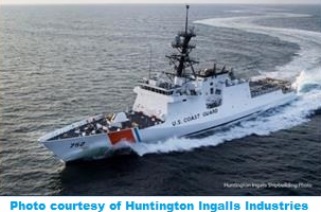The Coast Guard Authorization Act of 2015 was introduced in the House of Representatives last week by the leadership of the Transportation and Infrastructure Committee and the Coast Guard and Maritime Transportation Subcommittee.
The Coast Guard Authorization Act of 2015 (H.R. 1987) authorizes Coast Guard and Federal Maritime Commission funding levels for two years, and includes provisions to improve Coast Guard mission effectiveness, help modernize the Service’s aging vessels and other assets, and reform U.S. maritime transportation laws.
The bill was introduced by Coast Guard and Maritime Transportation Subcommittee Chairman Duncan Hunter (R-CA), along with Transportation and Infrastructure Committee Chairman Bill Shuster (R-PA), Transportation and Infrastructure Committee Ranking Member Peter DeFazio (D-OR), and Coast Guard and Maritime Transportation Ranking Member John Garamendi (D-CA). Click here to read the bill.
“The men and women of the Coast Guard continue to perform a vital role in supporting maritime safety and security,” said Hunter. “With bipartisan support, this bill seeks to strengthen the Coast Guard’s ability to meet their broad array of critical mission needs.”
“The work of the Coast Guard is essential to a safe, efficient, and secure maritime transportation system, and this bill responsibly supports the men and women who carry out that important work on a daily basis,” said Shuster.
“Congress must ensure that the Coast Guard has the resources and assets necessary to accomplish its mission, and this bipartisan bill attempts to meet that shared goal,” said Ranking Member DeFazio.
Specifically, the Coast Guard Authorization Act of 2015:
- Authorizes the Coast Guard for fiscal years 2016 and 2017 at currently authorized levels, ensuring the Coast Guard has the resources it needs to successfully conduct its critical missions.
- Supports Coast Guard servicemembers by ensuring Coast Guard officers and enlisted servicemembers receive access to the same benefits as their counterparts in the Department of Defense.
- Recapitalizes aging Coast Guard assets to ensure the Coast Guard has the tools to carry out its important missions and keep critically needed new aircraft, vessels, and related technology on schedule and on budget.
- Modernizes leadership by aligning the leadership structure of the Coast Guard with that of the other armed services to improve interaction and cooperation among the services.
- Improves national security competencies by authorizing the appointment of Coast Guard officers to critical national security assignments.
- Promotes private sector solutions by encouraging the Coast Guard to explore commercial off-the-shelf technologies to solve problems affecting mission performance.
- Seeks independent recommendations by requiring the Government Accountability Office to review Coast Guard mission performance and provide recommendations on ways to improve effectiveness.
- Enhances accountability in acquisitions by making important reforms to the acquisition process to reduce costs and improve the quality of assets delivered.
- Increases congressional oversight by requiring the Coast Guard to plan for its long-term acquisition and manpower needs.
- Prevents taxpayer dollars from being wasted by authorizing the Coast Guard to recover its costs for servicing privately-held marine events and eliminating, consolidating, and modifying duplicative and outdated reporting requirements.
- Supports U.S.-flagged and -crewed vessels by strengthening the enforcement of current law that requires cargo financed by the federal government to be shipped on U.S. flagged vessels.
- Reduces regulatory burdens by requiring the Coast Guard to certify local physicians to make medical fitness determinations of merchant mariners, aligning the expiration of the multiple documents American mariners must carry to work on board vessels, eliminating the need for annual registration of recreational vessels, and encouraging the Coast Guard to reduce reporting requirements on industry.
- Promotes common sense regulations by revising outdated regulatory definitions to bring them in line with modern industry practice and to improve manufacturing efficiency and recreational vessel safety.
- Improves accountability at the Federal Maritime Commission by including reforms to the proceedings of the FMC and prohibiting the spending of taxpayer funds on superfluous awards.
For more information about the bill, click here




